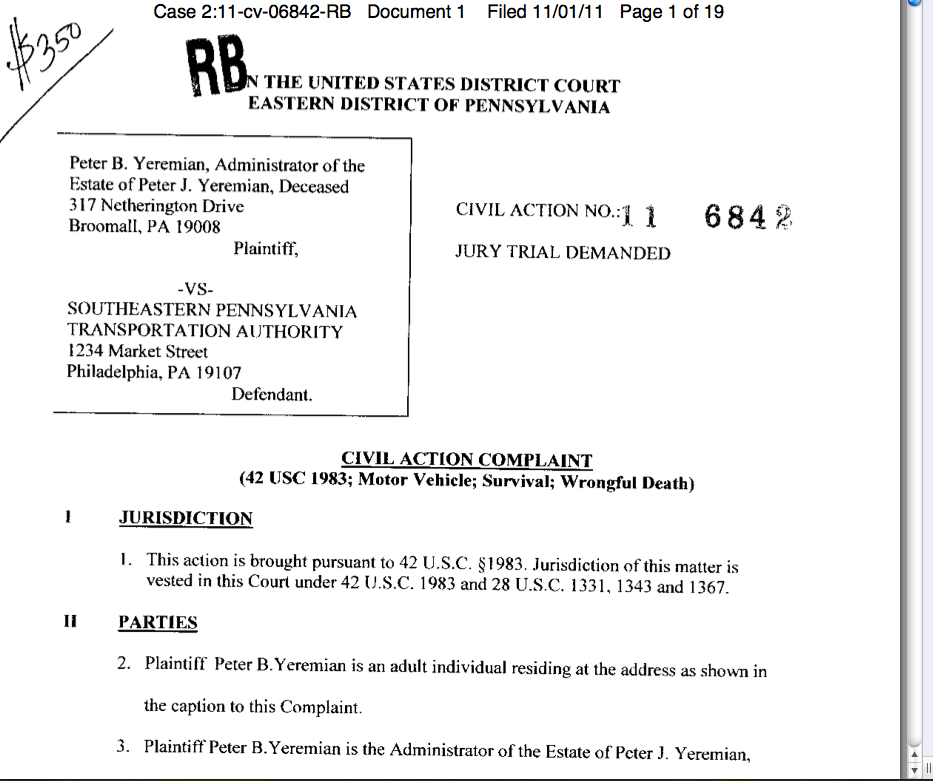Wrongful death suit says SEPTA should have done more to help a possibly drunk passenger

The estate of a Delaware County man is suing SEPTA, claiming the transit agency should have done more to prevent his death, possibly related to alcohol, on a SEPTA vehicle last year.
The complaint alleges that a SEPTA operator noticed that Peter J. Yeremian, 25, was “staggering and possibly intoxicated” when he boarded a Norristown High Speed Line train at about 8 p.m. at 69th Street Terminal on Jan. 29, 2010.
He took a seat about four rows from the rear of the train.
About 40 minutes later, the complaint says, the train arrived at its terminal at the Norristown Transportation Center, and the operator tried but failed to awaken Yeremian, “who was slouched to the right.”
A SEPTA dispatcher told the train operator to continue normal operation of the train and said that police would board the train after it arrived at 69th Street, the complaint says.
Yeremian was found dead after the train arrived at the Upper Darby transit hub at about 9:20 p.m.
The wrongful death suit ― filed in federal District Court on behalf of Yeremian’s estate by Peter B. Yeremian Nov. 1 ― argues that SEPTA should have stopped the train when the operator realized Yeremian’s impaired state.
“Yeremian’s death occurred as a result of [SEPTA’s] insistence on keeping its vehicle moving,” the complaint says, adding that SEPTA is “required by law to use the highest degree of care for the safety of its passengers.”
In failing to stop the train, SEPTA was “placing the operation and schedule of its vehicles in a position paramount to its legal obligations to its passengers,” the complaint says.
It also says that SEPTA has “failed to establish written policies to be followed by its employees when confronted with an impaired passenger” while also failing to enforce its “established policies for attending to impaired passengers.”
The suit seeks at least $750,000 in damages.
A lawyer for the estate didn’t return a call for comment, and SEPTA spokesman Richard Maloney declined to comment on pending litigation.
Yeremian’s death occurred four months before the widely publicized death of Leonard Sedden, 68, on a SEPTA Night Owl bus in Philadelphia.
In that incident, SEPTA told a bus driver to continue her route after she reported that Sedden was unresponsive, drooling and incontinent. A field supervisor boarded the bus and wrote a report saying that Sedden was sleeping.
SEPTA discovered that he had died after police boarded the bus at the Frankford Transportation Center.
Then-Transport Workers Union Local 234 president Willie Brown strongly criticized SEPTA for its handling of the situation, saying that SEPTA supervisors on duty should have stopped the bus and called for help.
“You never sacrifice safety for schedule,” Brown told PlanPhilly in an interview.
SEPTA, meanwhile, argued that the TWU had ginned up the controversy and wrote bus operator Nikita Manfra’s report of the incident.
The authority also defended its handling of the incident.
Maloney told The Philadelphia Inquirer at the time that SEPTA operators frequently encounter intoxicated riders on their routes and that everyone involved had thought Sedden was sleeping.
Contact the reporter at acampisi@planphilly.com
WHYY is your source for fact-based, in-depth journalism and information. As a nonprofit organization, we rely on financial support from readers like you. Please give today.






